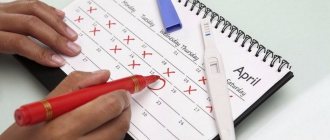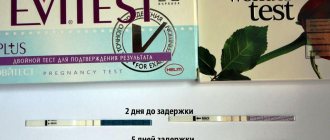The importance of ovulation in the process of conception
Every girl and woman who is of childbearing age undergoes regular processes in the body. When one menstrual cycle ends, the next one begins - and so on in a circle.
You can get pregnant before ovulation or not - this question can be answered after we figure out what the features of this process are.
During the onset of menstruation, the process of maturation and development of follicles begins. One of them continues to actively develop. Some time after this, a process occurs that is called “ovulation.”
This is a process in which the dominant follicle ruptures and a mature egg is released from one of the ovaries and exits the follicle into the fallopian tube. It usually occurs around day 14 of a 28-day cycle. However, the 14th day is conditional. In fact, a woman with a 28-day cycle can ovulate between days 11 and 21 of her period (the first day of your period is day 1). We call these days your “conception window.”
It is important for every girl to monitor her cycle. Otherwise, it's almost impossible to know when you're most likely to ovulate. A typical period is measured from the first day of the current menstruation to the first day of the next. The average cycle length is 28–32 days. There are no clear standards, everything is individual.
This delicate hormonal process of the female reproductive system is controlled by five main hormones. Each hormone influences each other to coordinate the development and release of the egg from the ovaries.
The brain produces three hormones: gonadotropin-releasing hormone, follicle-stimulating hormone, and luteinizing hormone (LH). While the other two hormones, estrogen and progesterone, are produced in the ovaries.
What is ovulation?
The ovaries and uterus are sacred organs in matters of childbirth. The first ones are responsible for the formation of the follicle, from which a mature egg . And the second is a shelter, a storage facility for the fetus for the next 9 months. When the follicle in the ovary reaches the required size, it cracks and releases a ready-made egg. This process is called ovulation.
The lifespan of an egg is no more than 48 hours, during which it must either find a “second half” with the paternal part of the genes, or die. It is impossible to get pregnant before this moment. The sperm cannot penetrate through all the barriers into the ovary and break the wall of the follicle, and even if it suddenly had such a superpower, the egg in any case is not yet mature and is not ready for fertilization.
Is it possible to get pregnant before ovulation?
Pregnancy before ovulation is technically possible only within five days before its onset and directly on “day X”. But again it should be said that everything is individual. There have been cases when girls became pregnant a week before their onset. In addition, if the cycle is shorter than the average, then even in this case you can get pregnant.
Previously, it was believed that during the ovulatory process, only one cell, ready for fertilization, is formed. But it has been found that sometimes, after two to three days, another egg is released. Which can also cause pregnancy.
However, statistics say that if a woman has had intercourse seven days or more before she ovulates, the chance of fertilization occurring is zero. As the days until the egg is released, the chances increase. The chance of getting pregnant the day before ovulation is highest.
But, again, there are exceptions. Therefore, girls who do not plan to have children should be careful with sexual intercourse. Therefore, contraception should be used.
Probability of conception
On the day of ovulation, pregnancy does not always occur, but only in 33−65% of cases. But fertilization can occur at other times. The fact is that sperm in the female body do not immediately lose their viability. Even if sexual intercourse occurred 3 days before ovulation, there is every chance of conception. When planning a pregnancy, doctors recommend regular intimacy throughout the week before the special day. If having children is not part of your partners’ immediate plans, then you should use available contraceptives.
How to increase your chances
To eliminate possible problems with conception and pregnancy, doctors advise starting planning in advance, approximately six months in advance. During this time, partners will be able to undergo the necessary examinations and tests to check their health and make sure there are no infections or pathologies.
Seven ways to help increase your chances of conceiving:
- You need to refrain from intimacy for 2-3 days before the expected day of ovulation. This can improve sperm concentration.
- Do not drink coffee and alcoholic beverages. No smoking.
- It is advisable to avoid harmful foods. Introduce more fruits and vegetables into your diet. Large quantities of meat, eggs and seafood are allowed.
- Be sure to take vitamins E, C and D.
- Try to avoid various stressful situations. Laugh more and get positive emotions.
- Do not use lubricants, as they trap sperm, disrupting their natural movement.
- Repeated sex on the day of ovulation, as well as new positions, is recommended. One of the best positions for conception is considered to be when a woman presses her knees to her chest. When the uterus is bent, the position when the partner is behind is more suitable.
What are the obstacles?
Even doctors cannot accurately answer the question of what exactly prevents pregnancy from occurring. In their opinion, the reasons may be completely different. Each woman has her own individual characteristics and problems.
The main factors that negatively affect conception:
- Excess weight.
- Early abortions.
- Hormonal disbalance.
- Age over forty years.
- Poor nutrition.
- Frequent stress and prolonged depression.
- The presence of infections in one of the partners.
- Long-term use of medications.
- Smoking and excessive consumption of alcohol and caffeine.
- Previous serious diseases that lower immunity (diabetes mellitus, tuberculosis, etc.). Men who have had mumps may be infertile.
- Diseases of the genital organs. In women: fibroma, polycystic disease, cervical erosion, thrush and the like. In men: aspermia, hypospermia, azoospermia, chronic prostatitis, disease of the urethra and testicles and some others.
How many days before ovulation can you get pregnant?
The day of the onset of the ovulatory process and the five days before that are the “fertile window” in the female cycle and reflect the lifespan of the sperm (5 days) and the lifespan of the egg (24 hours).
Is it possible to get pregnant before ovulation? The answer is yes.
There is often disagreement about this issue.
During this period, the egg matures and is released, and it can be fertilized. Of course, this does not always happen. An important role is played by whether the sperm are alive and what level of alkalinity of the vaginal microflora.
But pregnancy before ovulation is quite possible. If a woman had sexual intercourse 5 days before ovulation, the probability of pregnancy is about 10%.
At the end of the fertile window, the chance of pregnancy decreases rapidly, and 12 to 24 hours after the cell is released, the girl can no longer become pregnant during that cycle.
Concept and terms
Ovulation is the process of the release of a mature egg from a follicle on the surface of the ovary. It is this ability that a woman owes her fertility, that is, the ability to procreate. During the menstrual cycle, every month another egg matures, without which pregnancy becomes impossible on any day of the cycle.
Ovulation most often occurs around the middle of the female cycle. To be more precise, 14 days before the next menstruation. Many people believe that it is enough to simply divide the cycle length by 2 to get the ovulation date. This is incorrect, since 14 days is the duration of the second phase of the cycle, which begins after the release of the egg, and it almost always coincides for women of different ages and health conditions, regardless of the duration of the cycle. The error is small - about a day in one direction or another.
The biological meaning of this process is that the mature female reproductive cell leaves the follicle cavity and becomes available for fertilization. The lifespan of an oocyte is 24-36 hours, and it is during this time that the egg must meet the sperm or die.
In the first half of the female cycle, the process of oocyte maturation occurs. From the numerous ovulatory reserve in the ovaries, the maturation of several antral follicles begins. Of these, already 1-2 days after the end of menstrual flow, one dominant follicle stands out. The rest are undergoing reverse development.
Under the influence of follicle-stimulating hormone, an oocyte matures inside the follicle-sac in the fluid cavity, and this process takes several days. About a day before ovulation, a surge of LH (luteinizing hormone) occurs in a woman’s body, which makes the follicular membrane thinner, it ruptures and releases the egg into the abdominal cavity, from where it is immediately captured by the fallopian tube. This is where conception occurs, if it is destined to happen in a given cycle.
How to determine the day of ovulation
As we remember, the average female cycle is usually 28–32 days, but some women may have much shorter or longer cycles. Above we determined whether it is possible to get pregnant before ovulation. Now we will tell you how to calculate the favorable period for conception.
It is possible to determine when ovulation occurs only in the following cases:
- if the menstrual cycle lasts the same number of days each month;
- if it is regular;
- if the woman’s health is fine.
It is important to take into account the fact that the female body is very sensitive. A failure in the date of the ovulatory process can occur at any time. Therefore, experts say that it is almost impossible to accurately calculate the day every time.
However, there are ways that will help to at least roughly determine it.
A woman may ovulate at different times during her period, and it may occur on different days of the month. It's important to track your cycle, and luckily, there are a number of free ovulation tools available to help women identify their peak fertile days.
The cycle is divided into two parts:
The first part is called the follicular phase. This phase begins on the first day of the menstrual cycle and continues until the cell is released.
This first half, which lasts from 7 days to 40 days, can be very different for each girl.
The second half is called the luteal phase and lasts from the day of ovulation until the next period. The luteal phase has a more precise time scale and is usually only 12–16 days from the day the cell emerges.
When is pregnancy possible?
It is quite obvious that fertilization is possible only when there is a living sex cell in the woman’s body that is capable of fusion. Male reproductive cells do not need to calculate the favorable period - representatives of the stronger sex are ready for fertilization every day from youth to old age.
Thus, the best day for conceiving a baby is the day of ovulation and the next day (24-36 hours), during which the female gamete remains viable. Then fertilization is impossible, and you will have to wait for a new menstrual cycle and the next ovulation.
The chances, to put it mildly, are small, and therefore nature took care of the woman, compensating for the short life span of her reproductive cells with the longer life of sperm. The average sperm of a healthy man lives from 3 to 5 days, and all this time they can patiently wait in the woman’s genital tract for the favorable moment when the egg leaves the follicle and becomes available.
Sperm live longer if the acidity level of the female vaginal environment is low. Therefore, women who notice the appearance of copious mucous discharge before ovulation, resembling raw chicken egg white in appearance, have a higher chance of becoming pregnant if they have intercourse before ovulation. The fact is that cervical mucus is alkaline, and it partially reduces the acidity of the vagina, thereby increasing the chances of male reproductive cells to survive.
In general, the internal environment of the female reproductive tract is considered favorable for the existence of sperm, and therefore even men with unimportant spermogram results (reduced speed of gamete movement, there are morphological abnormalities of sperm) have every chance of becoming a father by having sexual intercourse a few days before ovulation.
It is not necessary that during the specified period of the fertile window (4 days before ovulation, ovulation and 36 hours after it) there should be full-fledged unprotected sex with the man ejaculating into the woman’s genital tract. Conception can occur during this favorable period and as a result of interrupted sexual intercourse, since some of the man’s germ cells can still enter the vagina if coitus is not completed on time. In addition, some of the completely viable sperm may be part of the physiological lubricant that is secreted by a man at the moment of sexual arousal, and then the sperm will end up in the female tract even before the partners take “preventative” measures for interrupted intercourse.
You can get pregnant even if a woman inadvertently introduces sperm into the genitals on her hands, as well as if seminal fluid gets on the external genitalia of her partner. Naturally, in these cases, significantly fewer sperm will penetrate into the female body, but do not forget that to conceive a million cells are not needed, just one is enough. And among the individual sperm there may well be that “lucky” one who will be able to fertilize the egg immediately after it leaves the follicle into the ampullary part of the fallopian tube.
Tracking ovulatory processes
Determine the length of your average menstrual cycle. The first day is the first day of the menstrual cycle, and the last day is the day before the next period.
The ovary ovulates approximately two weeks before the next expected period. So if your average menstrual cycle is 28 days, this occurs around day 14.
Remember that the fertile window is the six days leading up to ovulation, including the day the cell is released.
The three days preceding and including the ovulatory process are the most fertile. The most fertile days vary:
If you have 28 days between periods, ovulation typically occurs on day 14, with the most fertile days being days 12, 13, and 14.
If you have longer cycles, say 35 days between periods, ovulation occurs on day 21, with the most fertile days being days 19, 20 and 21.
If you have shorter periods, say 21 days between periods, ovulation occurs on day 7, with the most fertile days being days 5, 6 and 7.
Methods for determining favorable periods:
- Maintaining a women's calendar.
- Observations of changes in mucus. During ovulation, you may notice that your vaginal mucus is clear and slippery, resembling the consistency of egg white. This is the best sign that the egg is actually being released.
- Use of special tests.
- Measuring basal body temperature. During the ovulatory process it increases.
- Using special calculators that can be found on the Internet. To do this, you need to determine the cycle duration.
You can also visit a doctor and undergo an ultrasound examination.
Methods for determining ovulation
If you do not want to rely on chance, then it is better to start planning your pregnancy using proven methods. This will not answer the question of whether it is possible to get pregnant before or after ovulation, but it will allow you to identify dangerous days. Each woman prefers the method that is most convenient for her. You can determine the moment of ovulation in the following ways:
- Calendar counting of dangerous and non-hazardous days.
- Ovulation test.
- Systematic measurement of basal body temperature.
- Ultrasound.
- Lab tests.
Each of these methods has its own advantages and accompanying disadvantages. It is advisable to use several methods at once, because pregnancy and ovulation are closely interrelated and without accurately determining the date of maturation of the egg, it is extremely difficult to conceive.
So, most ladies prefer to do the test, since this procedure is performed at home. The same can be said about measuring basal temperature, although the process itself is not pleasant. As for ultrasound and laboratory tests, these methods give an accurate result only after several visits to the doctor during the menstrual cycle.
Why can't I get pregnant?
If you are trying to have a baby and are unsuccessful, you are most likely doing so during a period that is considered unfavorable for fertilization. It is important to remember that the leading role is played by the day on which the egg is released from the follicle. You should calculate the “conception window” that will help you achieve what you want. Remember that after the egg is released, you will no longer be able to conceive a child and will have to start again next time.
If you are sure that you have correctly determined the day of egg release, but still do not get pregnant, you should consult a doctor. There is no need to panic right away. Fertilization is affected by many factors, and consulting a specialist will help you determine what the reason is. Perhaps you are doing something wrong.
What affects ovulation
Our bodies are programmed to function like self-healing machines. However, each person has a different genetic makeup and is exposed to different environmental factors. Both genetics and environmental factors can affect levels of the reproductive hormone, which affects your chances of getting pregnant. If you think you are facing infertility, remember that there is a solution and that you are not alone.
Stress can play a big role in process disruptions. Practice stress-relieving exercises such as deep breathing, light exercise, stretching, yoga, meditation and positive affirmations.
Another important factor is a healthy and balanced diet. If you eat unhealthy foods, your chances of conceiving are significantly reduced.
Chemicals in our environment have a profound effect on how our bodies work. According to the Environmental Health Perspectives study, industrial complexes can reduce a couple's ability to have children by 29%.
Ways to help you get pregnant
You already know whether you can get pregnant before ovulation. If you're not sure you've timed it correctly, intercourse is recommended every 2-3 days to help optimize your chances of conceiving.
Planning pregnancy is the first step towards its occurrence. The chance of you getting pregnant increases dramatically (27% to 33%) if you have intercourse in the three days leading up to and including ovulation.
The course of sexual intercourse also plays an important role. The sperm must be allowed to penetrate the egg. Therefore, after finishing, you should lie down for a few minutes with your pelvis raised. You should not take medications.
Conceiving 1-3 days before peak fertility
When almost completely ready for fertilization, the environment of the female vagina becomes alkaline, which helps sperm maintain vital activity longer. Pregnancy occurs a day before the follicle ruptures, especially if the man’s sperm are very “tenacious.” For speedy parenthood, married couples should make love more often so that the woman’s body can form an embryo by the time it matures. The following recommendations help increase admissibility:
- After the end of intimate contact, you should not douche;
- It is not recommended to introduce medications into the vagina;
- It is better to take a shower after making love after half an hour; before that, lie on the bed;
- A pose with an elevated pelvis will help speed up the process of penetration to the uterus. Place a pillow for comfort and hold the position for 30 minutes.
When planning motherhood, it is better to make love 1-3 days before the fertile period, then the chances will increase several times.











